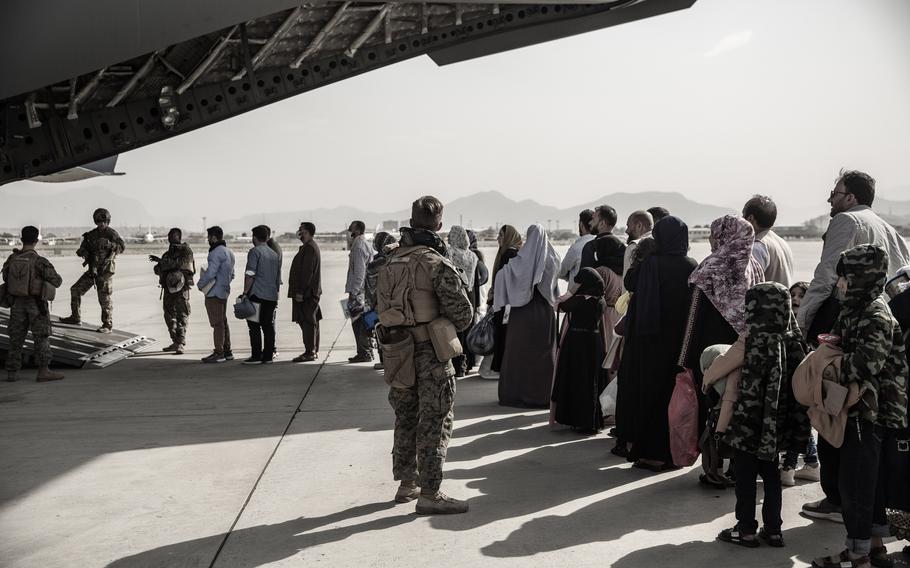
Evacuees wait to board a Boeing C-17 Globemaster III at Hamid Karzai International Airport in Kabul, Afghanistan, Aug. 30, 2021. Afghans evacuated by the U.S. are kept under constant surveillance in the United Arab Emirates, Human Rights Watch said in a report March 15, 2023. (Victor Mancilla/U.S. Marine Corps)
A human rights group is calling on the U.S. to help more than 2,000 Afghan asylum seekers who fled during the withdrawal of American forces in 2021 and are being held in what it calls “prison-like conditions” in the United Arab Emirates.
Between 2,400 and 2,700 stranded Afghans are being kept under constant surveillance and denied mental health services, the New York-based Human Rights Watch said in a report Wednesday.
The Afghans have been “locked up for over 15 months in cramped, miserable conditions with no hope of progress on their cases,” said Joey Shea, UAE researcher at Human Rights Watch.
The UAE has hosted 17,000 Afghan evacuees at the Emirates Humanitarian City, a former apartment complex in Abu Dhabi, a UAE official with knowledge of the situation who insisted on anonymity said in an emailed response Wednesday.
These Afghans were part of the U.S. airlift that flew 120,000 people out of the country’s capital, Kabul, after the Taliban overthrew the U.S.-backed government in 2021. The flights brought them to the U.S. and more than a dozen other countries.
About 87% of the refugees who went to the UAE, which was meant to be a temporary stop, have been resettled, the UAE official said.
The remaining evacuees were initially hopeful that they would be brought to the U.S. within weeks, but instead they continue to await immigration reviews and have no guarantee of admission to the U.S., the Human Rights Watch report said.
Many of the Afghans now in the UAE did not know where they were being flown to prior to leaving Kabul, the report said. The rushed withdrawal involved both U.S. military transports and charter flights organized by ad hoc groups of private citizens, and some Afghans boarded the first plane out that they could.
Afghans at the Emirates Humanitarian City said guards do not allow them to leave and restrict people from visiting them, said the report, which relied on interviews with 16 people there.
The evacuees do not have access to mental health services, and many adults and children struggle with depression and anxiety, Human Rights Watch said.
At least one person attempted suicide and a former Afghan supreme court judge died in the camp from an apparent heart attack, according to the report.
“He was alone and depressed. He was here for one year without his family,” a person who knew the judge told Human Rights Watch.
Afghans also lack adequate access to legal counsel, and children at the Emirates Humanitarian City have not been able to continue their education, the report said.
The U.S. should urge the UAE to release detained Afghan evacuees and speed up its processing of pending immigration cases of evacuees, Human Rights Watch said.
Emirati officials said in response that the country provides high-quality housing and other services to Afghan evacuees.
“The UAE continues to do everything it can to bring this extraordinary exercise in humanitarian resettlement to a satisfactory conclusion,” the UAE official said Wednesday. “We understand that there are frustrations and this has taken longer than intended to complete.”
The State Department responded to the report Tuesday with a letter saying the U.S. remains committed to resettling all eligible Afghans.
More than 88,500 Afghan citizens arrived in the U.S. as part of an evacuation known as Operation Allies Welcome.
U.S. veterans groups and immigration advocates say an estimated 200,000 Afghans who were affiliated with the U.S. military or civil society groups are still seeking refuge in the United States.